The Roots of Time. Sophia Andrukhovych about Amadoka
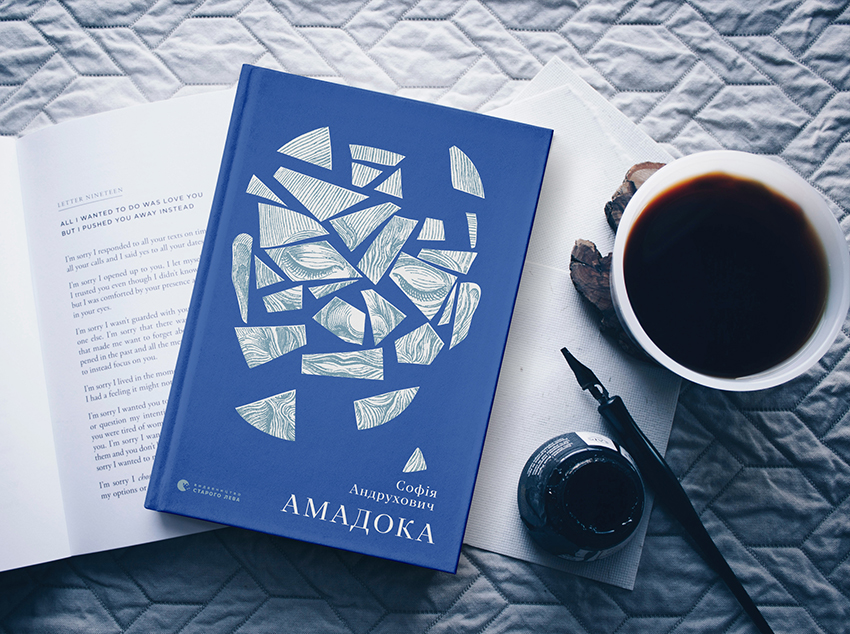
Good thing that humans invented time. Whichever way you look at it – time can either make things hectic or slow them down. Time helps to measure, and therefore organise, and therefore get a perspective. Time is a reference point that helps to compare, explain, understand and evaluate. Time means something, and it is something important.
by Sophia Andrukhovych, Versopolis Review
For example, it is important as to how many years one has lived. It is also important as to what time one wakesup and what time one goes to bed. It is important as to what age one began to walk, when one learned to read, what year one saw the sea for the first time, and the mountains, on what day one got married and how long one was married for. How long it takes to get to work. How much time is spent in traffic jam. How long one can go without coffee, alcohol, cigarettes, sex, and communication. It is very important as to how much time one spends each day preparing breakfast and how much time is spent on eating dinner. And how quickly one can deal with a particular task. Typically, the faster someone gets their job done, the more praise they deserve. But there are some activities that don’t get credibility or approval if done hastily. Sometimes it may seem that the amount of time it takes to complete certain tasks is one of the main criteria by which they are judged.
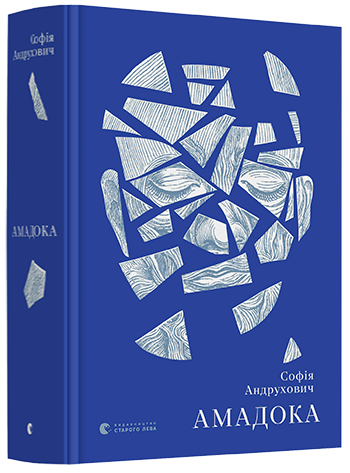
The relativity of time can be confusing. It’s rather good that people too rarely think about it and just take as a given either the fifteen minutes during which the artist painted a moment in time when the darkness of the night begins to dissipate, or those twenty years during which the writer has been writing, destroying and writing anew an allegory of collective unconscious.
But do we know how many years and nights are combined into the moment that has captivated the artist? How much time he has devoted to finding the exact brushstroke on the canvas to get that perfect depth of colour? And haven’t we lost forever a free, spontaneous, truthful and touching text because the most authoritarian of critics thought that too little work had been put into it – meaning, too little time spent?
We do not always believe that some moments have more depth, danger and bring more experience than some years. This would only confuse us, as we are already rather bewildered and hampered by the awareness of the limitations of our time, its eternal shortage, our chronic failure to keep up, constricted by the walls of a temporal corridor that compresses our fragile bodies, putting pressure on our chests, taking up space, sucking oxygen from our brains – and driven into the same dead end by an endless list of things that we shall never have time to accomplish, responsibilities that we cannot cope with, achievements that we will never attain, names of must-read books that we will never read, all the blogs we won’t see, places we’ll never check in to, unedited selfies, unburnt calories – all our unpaid debts.
Simplification is just a little self-indulgence, an attempt to make life a bit easier, to relieve tension. The time with which we measure ourselves, our history, the history of mankind, the time that we devote to ourselves, as if it were a piece of the pie with which we get ourselves in order, with which we punish ourselves, is a metaphor for our fear, suffering, crippled love – a metaphor for events that happened to us, or those that once happened to others (as a rule, these are the same events).
It is impossible to retell this fear, this suffering, and this crippled love. This fear, this suffering, this crippled love is painful or even impossible to look at. But if you measure them, if you divide them into parts, if you call one portion “past”, another one – “present”, and the last one – “fiction”, if you arrange what is so difficult to express in a chronological order, and try to express the unspoken, to measure out one more portion of time for yourself, there is a chance to understand at least something, to move somewhere, to leave your constraints for a while, in order to become this fear, this suffering, this crippled love.
Each story is a story about time. Each story about time is a story about a connection: between times, between people living in different times, in different places, connections between places, between actions, and between events. It is important to point out clear, logical connections. But it is no less interesting and difficult to look for ghostly, unclear connections – connections that are built by the whims of the human psyche. It is obvious that a person can lose memory, experiencing events that contradict their consciousness, the basis of life itself. Apparently, memory loss can save a person’s life. But can anything bring lost memories back? And should it necessarily be signals associated with the direct experience of a person, with their history? And what is a human without memory? And does human consciousness exist after one loses one’s memories? Or is a person with memories imposed on them able to move on with the history of someone else’s guilt? Where is the borderline between your own and other people’s stories, your own and other people’s memories, your own and other people’s dreams, times, territories, styles, genres, destinies? What will happen if we manage to go beyond this line?
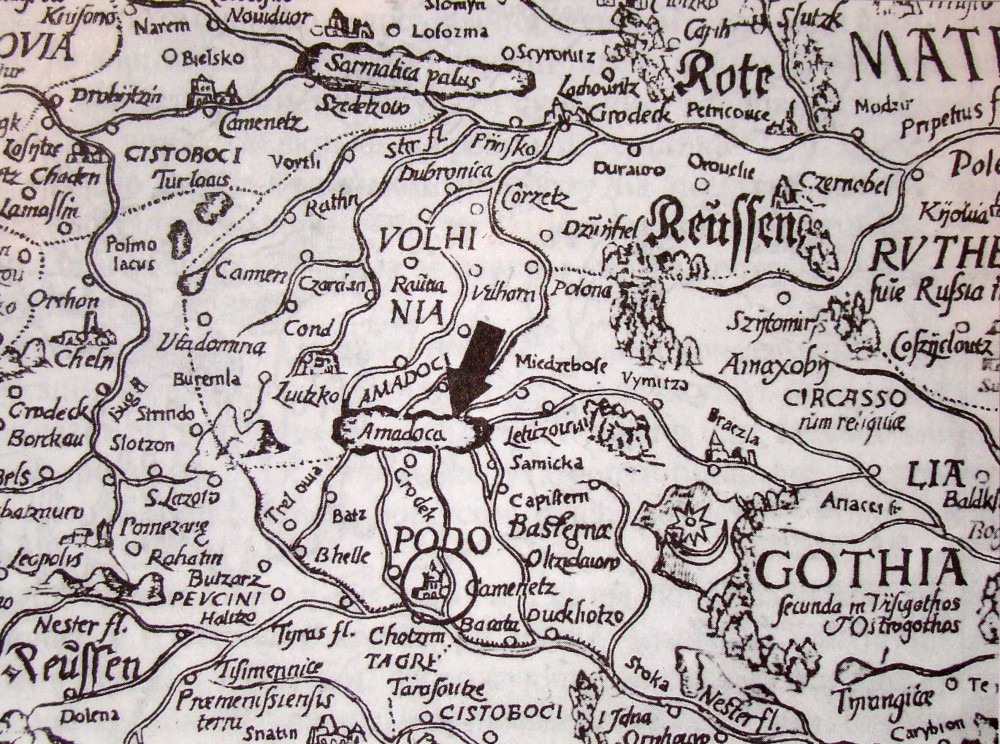
Caspar Vopel, Map of Europe, 1566
So where was the starting point of the swim across Amadoca Lago, where was the point of departure? Perhaps at the moment when, while searching for information about one of the incarnations of Victor Petrov, namely the archaeologist Petrov, one has a sudden flashback of a quote from Herodotus about wild white horses grazing on the shores of a large lake in the Scythian lands. Perhaps the countdown should start at the moment the name appears, when an unformed, raw idea gets its name. It is as if a spine begins to form, making it much more convenient to build up other bones and cartilage, muscles, fascia and flesh around it.
But before all that, there were months of visiting the damp and cold rooms of the archive, where for some reason the most sensible idea that came to mind was to copy by hand other people’s love letters, first having spent a long time deciphering the squiggles of the archaeologist who seemed to have shared his occupation with another character. It was an experience that implied dressing warmly in order to withstand at least a few hours within the walls of the room. There was the rustling of the archive employees, their whispers of love stories and other kinds of confessions from the diaries of the intelligentsia killed under Stalin – you would only share news from the lives of people close to you in such excited and rapturous manner. One day somewhere an image appeared of this woman in glasses called Romana – the one who finds it difficult to distinguish between the living and the dead, the fictional or the real.
And did I think about Amadoca Lago at another time (long before the two previous periods of time), in the autumn week in a town of the Ternopil region – in a hotel on the outskirts, where sheep were grazing in the yard, and the rooms seemed sticky because of the buzzing of flies? It is possible that it, the lake, was coming down onto the plain of the town with endless dull rains, was soaking the foundations of the synagogue, invisible under the ground, under the building of a modern shopping mall, breathing out dampness from the gates, watering mold in wells, corroding the walls of buildings and residents’ memories. It was there and then, it seems, that I suddenly woke up to my own limitations, forgetfulness, and inertia. Perhaps one of the sources was the fear of realising what had happened, and been experienced while looking at the picturesque panorama from the highest windows of the Town Hall, the fear felt while touching the sculptures of Pinsel destroyed by time.
How many of them there were – these streams, trickles, time periods, storylines, ways of thinking, and how untenable it was to catch at least something, and how inexorably time flew by while nothing was being done. Each recollection of the ones who survived forced you to follow the same path time and again, each time in a new way, to relive the events in a chronological order, each time knowing what laid ahead. The stories of people who have become victims turn out to be very similar in the way they are told: they are united by brevity, skimpiness and conciseness, almost primitive narration. Simple sentences, no embellishments, a minimum of artistic means. Poetry is non-existent. Awesome places, which you cannot leave once you’ve been there. But the most amazing thing is that you don’t want to leave these places. You realise that nothing can be changed, so out of the sense of duty or dependency, you stay there until you completely lose yourself. Dante’s voices travel. Wandering in search of intonation. Wrong intonation is an error, a crime, a sin.
Then bang: stylistic impassability, the redundancy of prose by Piotr Ravich – a Jew from Lviv, who managed to survive in a concentration camp due to the fact that he pretended to be a Ukrainian nationalist. It looks like he really was one.
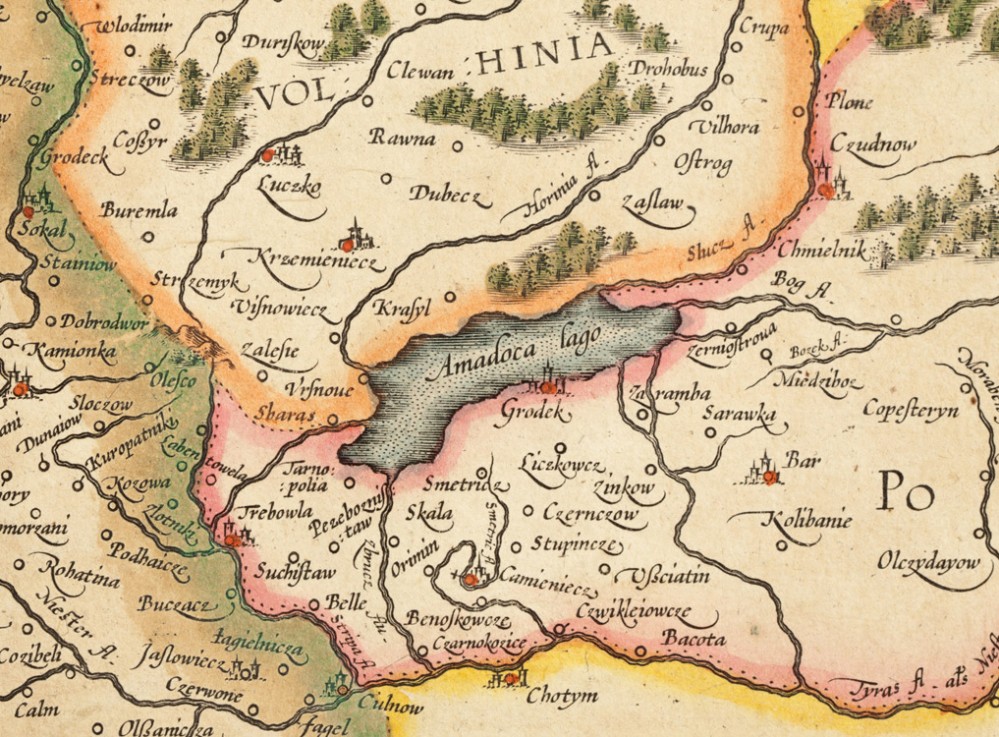
Gerard Merkator, Lithvania Gerard Merkator, Amsterdam, 1609
Bang: the story of Misha Defonseca, a Jewish girl who escaped persecution thanks to a pack of wolves. The child travelled through the whole of Europe, learned to hunt and speak the wolf language; the animals took in a human puppy and protected it from human bloodlust. The memories of a Holocaust victim, which became a sensation, a bestseller, were made into a film, later turned out to be the total fabrication of the daughter of a Belgian Resistance member and traitor – a kind of psychological defense, a game of consciousness of the author who, as a child, suffered abuse because of her father’s betrayal, and so to ease the pain of memories, she identified herself with the most persecuted victims.
Time spent in the company of the dead. Establishing connections, connecting points that are distant in space: Kyiv now and in the 1930s, Buchach in the 18th century and in 1939, Mariupol, Munich, the Blizhny and Dalny Gardens, the steppes of Skovoroda and the steppes of Scythian burials, the Pinsel’s sky and the heavens of the Baal Shem Tov, the war in Donbas, the mutilated earth, disfigured bodies, distorted memory, the convolutions of the brains, the irregularities and depressions of landscape, the roots of actions, the roots of plants woven underground, the daily conversations with the living loved ones, listening to the stories of the dead. Your own invention, which gradually transforms into your own memories. Someone else’s texts become your own life experiences. Fictional characters that seem closer than many real people. A search for something that Eliot Weinberger calls “time-memory”.
In his essay “Matteo Ricci”, Weinberger talks about different traditions of retelling memories, the transformation of memory into words, the relationship between text and time: “The Western flashback technique is actually an artificial rearrangement of chronological sequences; it is not time-memory. The memory thinks simultaneously of beginning, middle and end; its sense of time is only the loss of time. Wordsworth and Proust, in their searches for the lost time, assume that memory is a stream, a stream they follow against its current. But the memory is a vortex, a simultaneity. No matter what the subject, the memory always thinks of something else, is always creating still lifes, collages. The pure (impossible) biography or autobiography would create constellations out of one mind’s associations, distractions, incongruous leaps: it would be regardless of time”.
There were many lessons to learn. One of them was that it is impossible to achieve a goal if you do not see the whole picture, the construction drawing. But, getting lost in these vast expanses, in the labyrinths of the century, in connections and symbols, in twists and turns, one can fall into a panic, a fear of a dangerous scale. Moving forward, as it turned out, can only be done step by step, without looking ahead too often, and not looking around too closely. The map was always in my pocket, but it was better to move in steps measured by a day of walking or writing.
Another lesson was about a constant search for a balance between the realisation that there is nowhere to rush, because it is impossible to make it there on time anyway, and, that to stretch this journey for a lifetime – would not be the best idea; seeking a balance between understanding that it is impossible to do better than you can, that it is better to do than not to do, and resign in humility in front of something that you cannot reach.
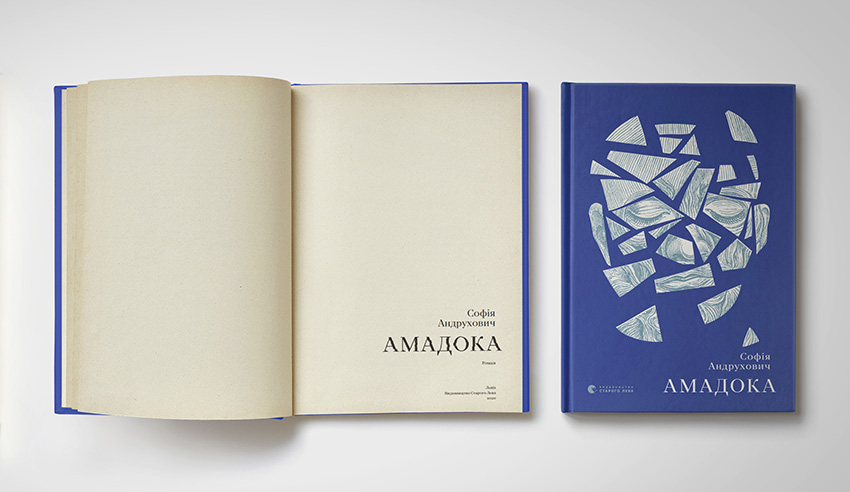
It was important to get away from this task, which took up most of my thoughts and time, absorbed all the attention, and to which almost all my efforts were devoted. To be able to carry on, every day, sometimes for days on end, sometimes even for weeks, I had to move away from the lake to a distance sufficient to forget about it. Turn my head away, walk the other way, get distracted – and come back every time. To voluntarily immerse myself in amnesia – to experience awakening.
And then the world would open up, connections would be revealed, and, though nothing could be changed, because everything happened a long time ago and irrevocably, at least an attempt would be made. What had remained a drawing on the map for so long would unfold in its multidimensionality. And then you had a feeling that you were going beyond the limits.
The pages, that eventually became the first ones, were written three years ago in the Carpathians. The two summers that followed, at about the same time – the time of blueberries, horseflies, thyme flowering – became, respectively, the epochs of the Holocaust and Stalin’s repression. This summer, right now, everything is the same: tadpoles scurry about in the puddles left after mountain showers; mosses breathe in cool moisture; the air smells of mushrooms. Tree roots are exposed in the mountains. The roots split the rock, hang over the cliff, and reveal themselves in the cuts of rocks and soil. These roots are a metaphor, and mountains are a metaphor. But, moreover, these are real roots and real mountains. The time after, the time before, the time right now.
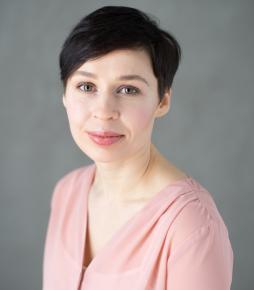
Sophia Andrukhovych is a Ukrainian writer and translator. She was born in 1982 in Ivano-Frankivsk, formerly known as Stanislav. One of the cultural centers of western Ukraine, the city is known for what has been termed the “Stanislav phenomenon” because of the curious fact that this rather small town is home to an unusually large concentration of postmodern writers. She has authored six books of prose to date: Milena’s Summer (2002), Old People (2003), Wives of Their Husbands (2005), Salmon (2007), Felix Austria (2014) and Amadoka (2020). Felix Austria was awarded the BBC Book of the Year prize (2014), Joseph Conrad Korzeniowski Literary Prize (2015), The Visegrad Eastern Partnership Award project (2017).
She is also an author of the book for children Hen Constellation (2015).
Her works have been translated into English, Polish, German, Czech, French, Hungarian and Serbian. She is also an author of essays and a translator. She lives in Kyiv.





Коментарі
Щоб залишити коментар, необхідно